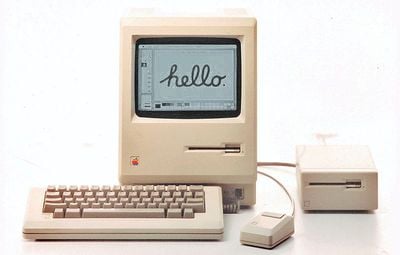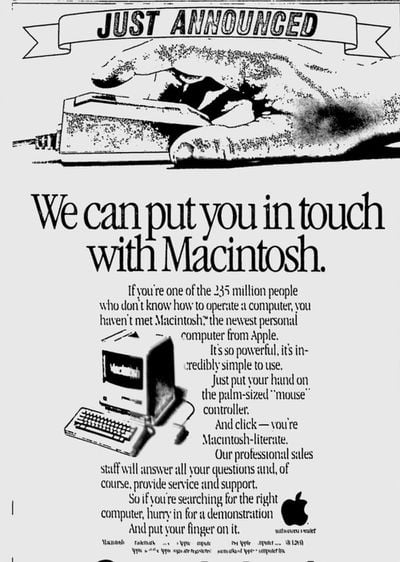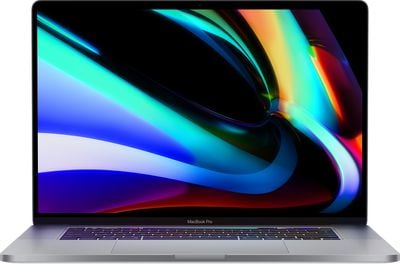On January 24, 1984, former Apple CEO Steve Jobs introduced the first Macintosh at Apple's annual shareholder's meeting in Cupertino, California, debuting the new computer equipped with a 9-inch black and white display, an 8MHz Motorola 68000 processor, 128KB of RAM, a 3.5-inch floppy drive, and a price tag of $2,495.

The now iconic machine weighed in at a whopping 17 pounds and was advertised as offering a word processing program, a graphics package, and a mouse. At the time it was introduced, the Macintosh was seen as Apple's last chance to overcome IBM's domination of the personal computer market and remain a major player in the personal computer industry.

Jobs pulled the Macintosh out of a bag at the event, powered it on, and the Mac had a little message for everyone in attendance.
Hello, I'm Macintosh. It sure is great to get out of that bag.
Unaccustomed as I am to public speaking, I'd like to share with you a maxim I thought of the first time I met an IBM mainframe: NEVER TRUST A COMPUTER YOU CAN'T LIFT!
Obviously, I can talk, but right now I'd like to sit back and listen. So, it is with considerable pride that I introduce a man who's been like a father to me... STEVE JOBS.
Despite the high price at the time, which was equivalent to around $6,000 today, the Macintosh sold well, with Apple hitting 70,000 units sold by May 1984. The now iconic "1984" Super Bowl ad that Apple invested in and debuted days before the Macintosh was unveiled may have helped bolster sales.
After the Macintosh, Apple introduced the Macintosh II, the Macintosh Classic, the PowerBook, the Power Macintosh, the iMac G3, the iBook, and so on, eventually leading to the current Mac lineup, which includes the MacBook Air, MacBook Pro, iMac, iMac Pro, Mac mini, and Mac Pro.
Today, Apple is one of the leading PC vendors in the world, shipping an estimated 18 million Macs worldwide in 2019. Then Apple competitor IBM is no longer in the personal computer business, having sold its technology to Lenovo back in the early 2000s.

Apple in the future is expected to continue expanding its popular Mac lineup, and current rumors suggest we can expect to see new 16-inch MacBook Pro models, a refreshed 13-inch machine with scissor keyboard, and, eventually, an ARM-based Mac.























